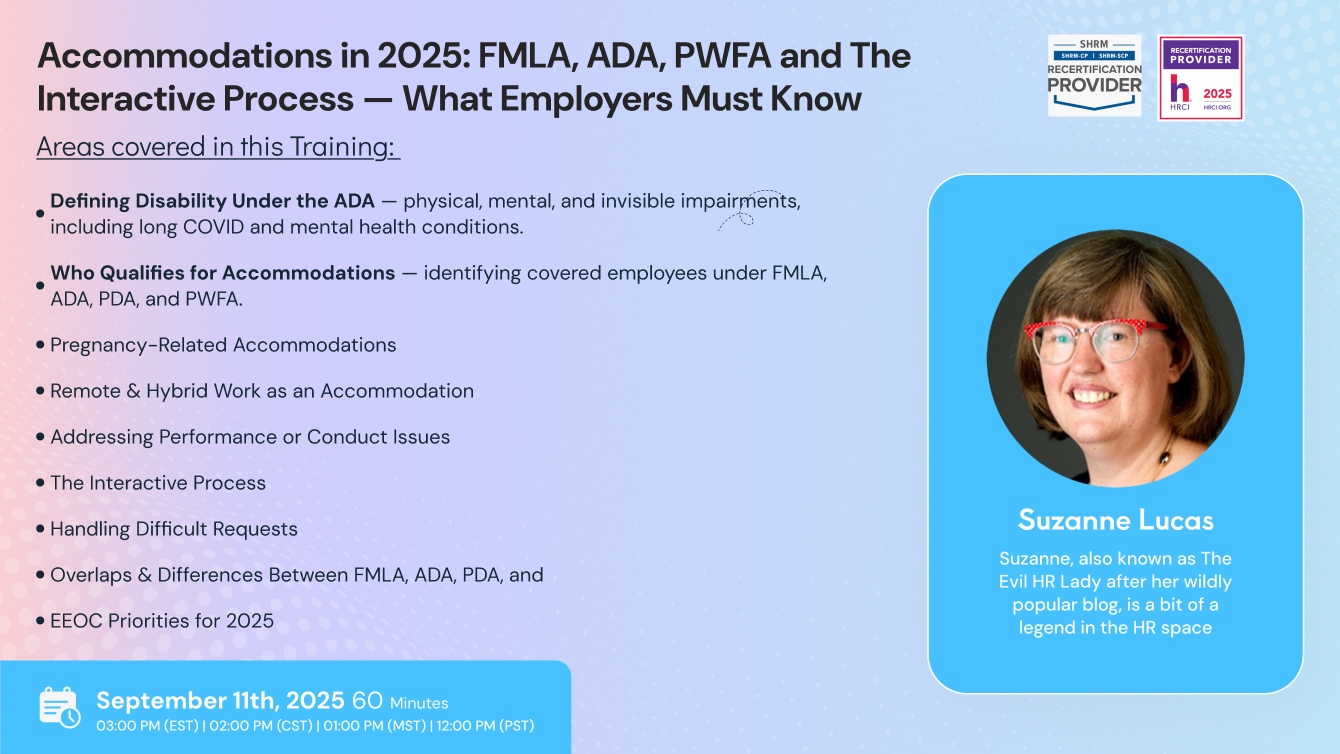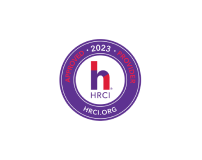Overview:
Employers are facing increasing accommodation requests — from disabilities, pregnancy, mental health, and long COVID — and compliance mistakes can be costly. Under the Family and Medical Leave Act (FMLA), Americans with Disabilities Act (ADA), the Pregnancy Discrimination Act (PDA), and the Pregnant Workers Fairness Act (PWFA), employers must provide reasonable accommodations and engage in the interactive process when an employee needs support to perform their job.
But what exactly counts as a “reasonable accommodation”? When does the obligation to start the interactive process arise? How do ADA and PWFA requirements overlap — and differ? Too often, employers misunderstand or mishandle these obligations, leading to lawsuits, EEOC charges, or employee relations problems.
This webinar breaks down the complexities and provides clear, practical guidance for employers, HR leaders, and managers on how to navigate the accommodation process in 2025 and beyond.
Areas Covered in This Training:
· Defining Disability Under the ADA — physical, mental, and invisible impairments, including long COVID and mental health conditions.
· Who Qualifies for Accommodations — identifying covered employees under FMLA, ADA, PDA, and PWFA.
· Pregnancy-Related Accommodations — what PWFA adds to existing PDA protections, and where employers are most at risk.
· Remote & Hybrid Work as an Accommodation — when employers must consider flexible work arrangements.
· Addressing Performance or Conduct Issues — balancing accountability with compliance when an employee discloses a disability or pregnancy.
· The Interactive Process — step-by-step on when and how to initiate discussions, even without a formal request.
· Handling Difficult Requests — negotiating without simply “giving in” and knowing when an accommodation can be denied.
· Overlaps & Differences Between FMLA, ADA, PDA, and PWFA — how to avoid compliance confusion.
· EEOC Priorities for 2025 — practical insights on enforcement trends and litigation risks.
· Ending or Modifying Accommodations — when it is legally defensible to stop or adjust accommodations.
Why Attend This Training:
· Stay compliant with FMLA, ADA, PDA, and the new PWFA — all of which have active enforcement in 2025.
· Avoid costly EEOC charges and lawsuits from mishandling accommodation requests.
· Gain clarity on mental health, pregnancy, and long COVID accommodations, which remain top areas of risk.
· Learn how to conduct the interactive process confidently, consistently, and fairly.
· Get practical strategies to balance business needs with legal obligations.
Suggested Attendees:
· Business Owners
· CEOs & CFOs
· In-House Counsel
· HR Managers, Directors, and Professionals
· Benefits & Leave Administrators
· Department Heads & Supervisors
· Small Business Owners
· Compliance Officers
· Senior Managers responsible for workforce policies

Suzanne Lucas
Suzanne Lucas spent 10 years in corporate HR where she hired, fired, managed the numbers, and double- checked with the lawyers. She left the corporate world to advise people and companies on how to have the best Human Resources departments possible.
Suzanne integrates best practices with innovative ideas and humour, including using improve comedy as a tool for leadership development.
Suzanne’s writings have been published at CBS News, Inc. Magazine, Reader’s Digest, and many other sites. She’s been named a top influencer in HR. You can read her archives at EvilHRLady.org or check out her Tedx Talk: Forget Talent and Get to Work.

SHRM -
Standeagle is recognized by SHRM to offer Professional Development Credits (PDCs) for the SHRM-CPSM or SHRM-SCPSM. This program is valid for 1.0 PDCs for the SHRM-CPSM or SHRM-SCPSM. For more information about certification or recertification, please visit - portal.shrm.org.

HRCI -
This webinar has been approved for 1.0 HR (General) re-certification credit hours toward California, GPHR, HRBP, HRMP, PHR, and SPHR recertification through the HR Certification Institute.
The use of this seal is not an endorsement by the HR Certification Institute of the quality of the activity. It means that this activity has met the HR Certification Institute’s criteria to be pre-approved for re-certification credit.

ACCREDITATIONS


